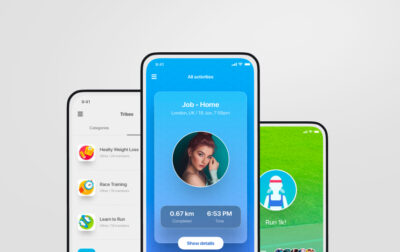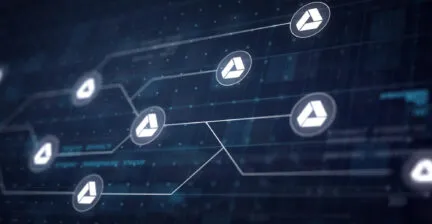Which is better in 2025 – AWS, Azure, or Google Cloud? (Updated)
Сloud computing holds a major spot in every tech environment. Businesses can scale more easily and affordably and drastically increase overall productivity with the cloud.
Statista reports that 63 percent of the market is taken up by the triumvirate of Google Cloud Platform (GCP), Microsoft Azure, and, of course, Amazon Web Services (AWS). So, almost certainly, one of these three will be your ultimate pick to enhance your cloud-based project.
Touchlane experts give a detailed description of the Big 3 to make navigating the platforms’ intricacies easier.
Platform overviews
Amazon Web Services has been an unchanging front-runner in the industry ever since its debut. It is an appropriate choice for different-sized businesses due to its reliability and cost-efficiency. AWS provides a flexible and cost-controlling pay-as-you-go model.
Microsoft Azure, or simply Azure, employs the pay-as-you-go approach for billing, which is identical to its main competitor, AWS. Microsoft’s platform is well-liked by enterprises as many of them currently work inside the Microsoft environment – think Office 365.
Google Cloud Platform also utilizes the PAYG model for billing. While not clashing swords directly with Azure and AWS for industry domination, GCP is a go-to choice for tech-savvy companies based on its use of cutting-edge tech and data expertise.
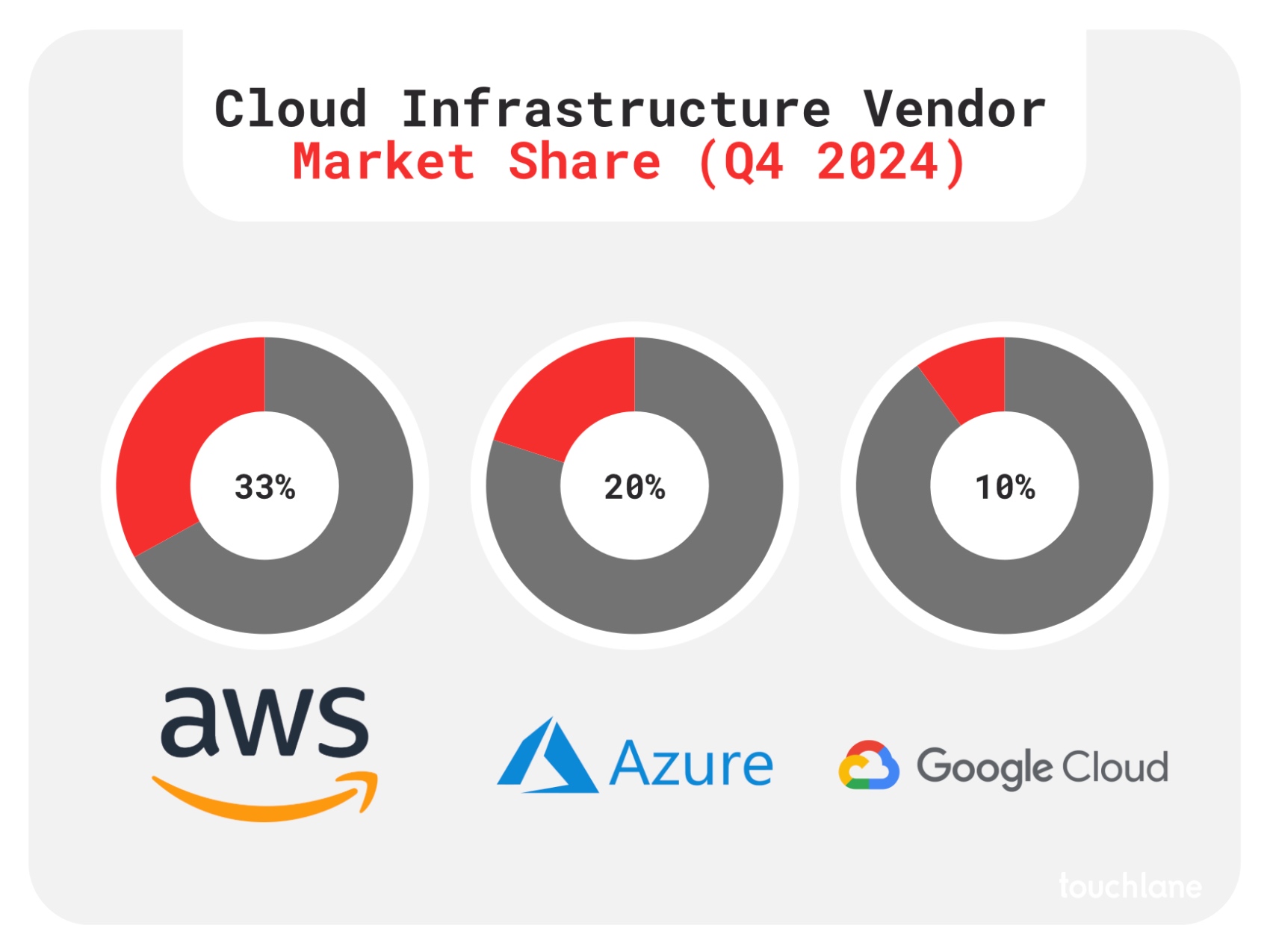
Core services and features
Although AWS, Azure, and GCP all provide virtual machines and serverless computing choices, they are definitely not one-size-fits-all solutions.
AWS, as the top player in the industry, has the broadest variety of services. That variety includes EC2, a web service that offers scalable, safe cloud computing capacity. They are also quite good at serverless computing with AWS Lambda.
At the same time, Azure is superb at integrating with products by Microsoft. It also provides serverless functions with its proprietary solution Azure Functions. It enables code execution without managing servers, as well as virtual machines with varied configurations for different workloads.
Finally, GCP is a data magician because of its exceptional analytics, as well as its skills in data processing. It offers serverless functions (via Cloud Functions) for code execution without server management and virtual machines (VMs) that are customizable through Compute Engine. GCP is the suggested option for users who wish to take use of the newest Kubernetes capabilities because it was originally created by Google. Even though Kubernetes is now open-source, Google is still its primary contributor.
Another creation from Google, TensorFlow, is the leading machine learning tool in the market.
To sum it up, AWS offers the broadest range of services, while Azure excels in enterprise integration, and GCP stands out in data-driven applications.
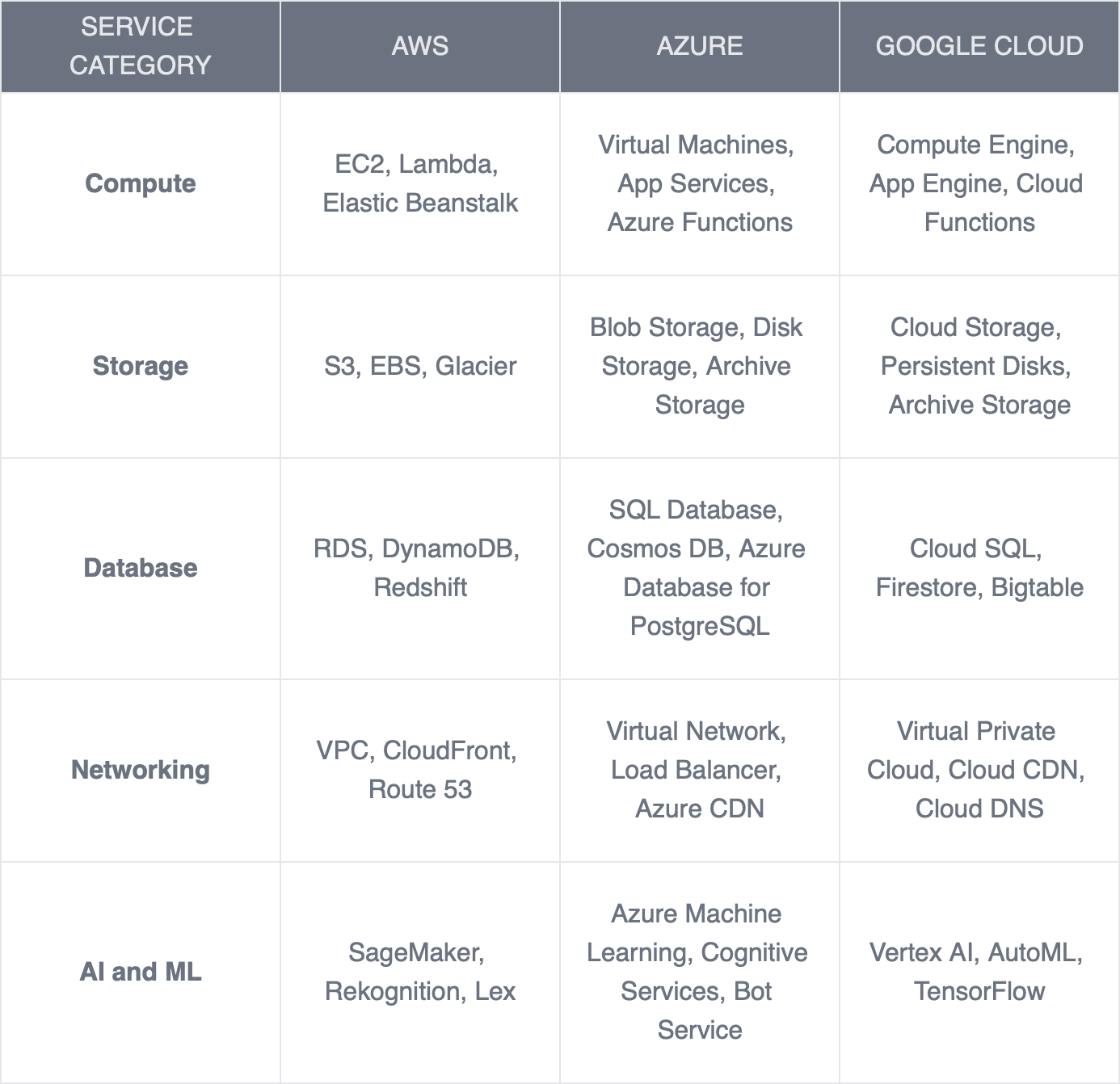
Free tiers
If you have never used the cloud before, you may want to start with a free tier. Thankfully, you may investigate and build initial ideas without paying any upfront costs because each of the platforms we look at in this article offers one. These free tiers usually consist of a mix of services that are always free with use restrictions and services that are offered for a short period (often 12 months).
Here is a quick breakdown.
- Azure gives access to 65 additional services and a $200 credit to spend on Azure within 30 days
- AWS offers the most liberal free compute instance utilization. There are two options to choose from:
– The Always free tier offers ongoing access to more than 40 services, including AWS Lambda and DynamoDB, with usage limits.
– The 12-month free tier provides 750 hours per month of EC2 t2.micro or t3.micro instance usage, 5GB of S3 storage, and access to additional services. - GCP includes $300 in free credit for new customers that may be used for three months on any GCP service.
Grant programs
Major cloud providers’ grant programs can be a catalyst for startups and small companies. These initiatives save upfront costs by offering resources to support the launch of operations.
For instance, AWS Activate provides categories of grants: $1,000 in credits and training for businesses that are self-funded, and up to $100,000 in credits and premium support for initiatives that are backed by venture capital.
Azure for Startups offers up to $150,000 in credits spread over two years, as well as technical advice and access to GitHub Enterprise.
Similarly, Google Cloud for Startups provides credits up to $200,000 (with up to $350,000 for AI startups) and two years of technical assistance in addition to credits for Google Workspace.
AI products
Cloud providers are responding to the growing popularity of artificial intelligence by offering a wide range of AI products. The Big 3 platforms have good alternatives for natural language processing and machine learning.
AWS has a plethora of services, such as image analysis tool Rekognition and model building tool Amazon SageMaker. All of these services are seamlessly integrated into its larger cloud ecosystem.
In addition, AWS offers Bedrock, a fully managed service for deploying generative AI models from multiple providers. Businesses can use it to integrate AI without handling infrastructure. It supports foundation models from Amazon, Anthropic, Cohere, Meta, and Stability AI. The service offers tools for text generation, summarization, and code assistance. AWS Bedrock works with AWS services like SageMaker and Lambda to provide a scalable option for AI-powered cloud applications.
Azure offers its Azure Machine Learning solution and, as we already know, easy Microsoft product integration to businesses.
Moreover, Azure OpenAI Service delivers advanced models like GPT-4 and DALL·E to the enterprise sector. It allows organizations to develop secure AI-driven applications with strong integration into Microsoft 365 and Azure Cognitive Services. Businesses can apply AI across various functions, which includes customer support, document processing, and real-time analytics. With solid security and compliance, Azure OpenAI is a trusted choice for industries with strict regulations and large-scale implementations.
Using Google’s AI research, GCP adopts an innovative strategy, providing solutions like Dialogflow for chatbot development and AutoML for non-technical consumers.
Besides, Google’s Gemini AI suite powers cloud applications with multimodal capabilities to process text, images, and code. Integrated into Google Cloud services such as Vertex AI and BigQuery, Gemini boosts automation, cybersecurity, and data analytics. Its close integration with Google Workspace facilitates AI-driven document creation, customer service automation, and predictive insights for enterprises.
Global availability
AWS has created a global network of Availability Zones (or AZs). It can provide industry-leading speed and resilience because of its extensive reach. Clients are able to deploy apps in any location that best suits their end customers.
Azure has been growing the number of its AZs too, with its data centers dispersed over 140 countries. Microsoft keeps making substantial investments to broaden Azure’s reach.
Google Cloud Platform is focused on gaining ground on the competition. At the moment, GCP is active in 40 regions, and its network offers competitive availability and speed. Moreover, new zones and areas are introduced regularly.
Infrastructure race
As of March 2025, 36 Regions and 114 Availability Zones (AZs) make up AWS’s global footprint. In the upcoming years, AWS intends to introduce more Regions and AZs. Meanwhile, Microsoft Azure is accessible in 126 Availability Zones and 60+ Regions worldwide. At last, GCP works across 42 regions and 127 AZs.
Ease of use and management
When you decide between the Big 3, it is vital to think about how much cloud-related experience you have at all.
AWS may have a bigger overall number of services, yet, its depth can be excessive for newcomers. Azure and GCP’s friendlier interfaces and tools might be a better fit if you are new to the cloud.
If you use Microsoft tools all around, your perfect match is Azure. Meanwhile, GCP excels in developer experience. In the end, the choice should depend on your needs and comfort level. If you are still not sure, free trials are available for all three to help you decide.
Specialties
If you compare AWS to Azure, it is the former that has greater storage choices, but the latter has specialty services like Data Lake intended for large-scale, data-intensive apps. While Google may provide fewer storage alternatives, they are more cohesive and focused.
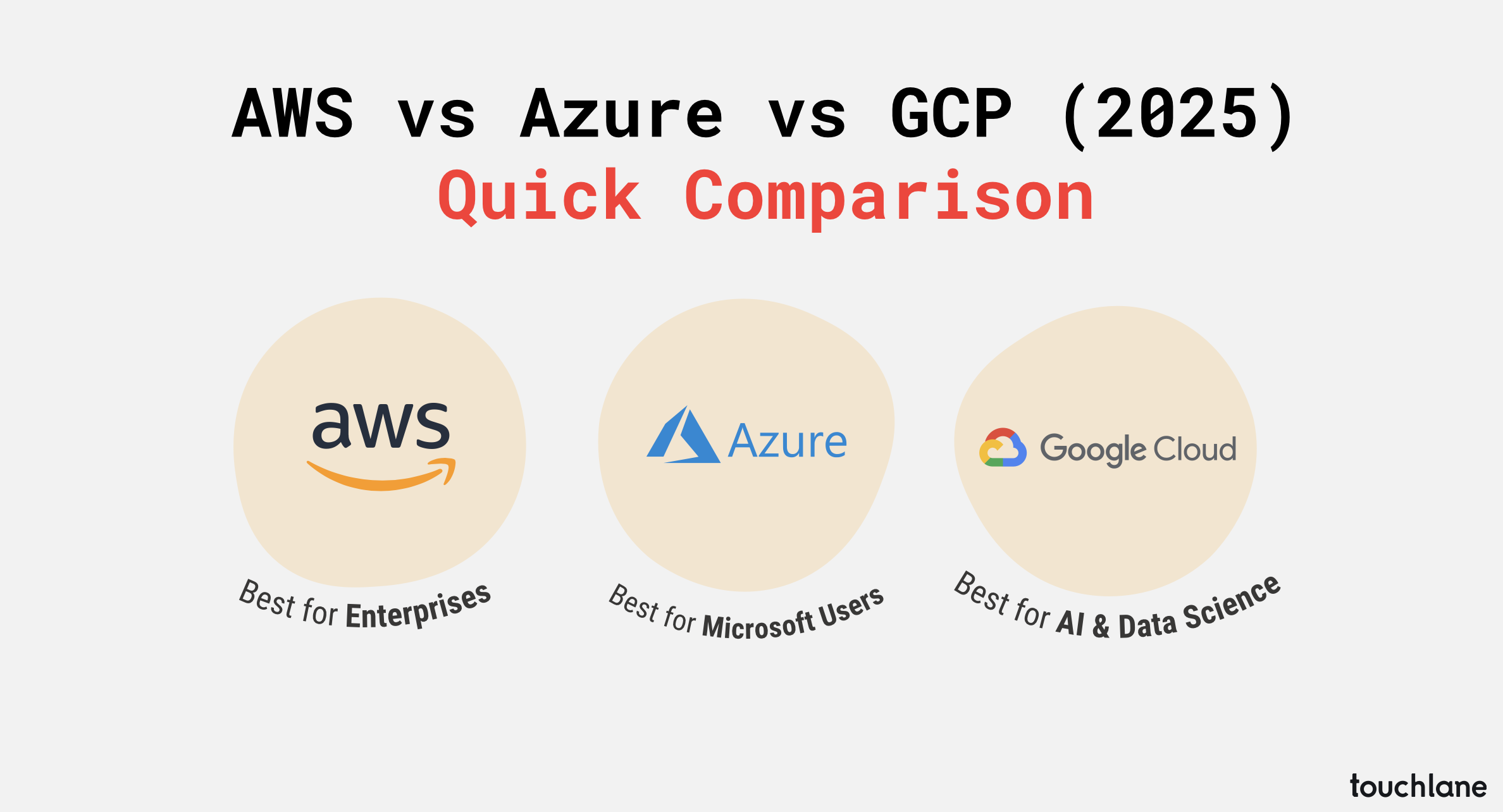
The Touchlane experience
At Touchlane, we excel at working with each of the Big 3 platforms and delivering solutions of any scale. If we look at some of our company’s most notable projects, here is what we choose for them.
Color Therapy, a Touchlane-developed coloring app for relaxation and mindfulness, is powered by Azure. The app uses Azure’s CDN to synchronize and send massive amounts of data to users all around the world in real time.
To build Racefully, an easy-to-use social fitness tracker, we put our trust in AWS and delivered a solution that assists people in building good sports habits. Our team integrated AWS products, namely Amazon Cognito and DynamoDB for user authorization and social parts of the app’s system.
Gaimin, one of our most ambitious fintech projects to date, utilizes Google Cloud in the backend. This includes integrating Prometheus for metrics and monitoring, deploying MemSQL databases using a custom Kubernetes operator, and deploying apps using a Kubernetes cluster with Helm. We chose GCP because it was the only cloud platform offering a Kubernetes service at the time.
Conclusion
Making a definitive decision of the right cloud provider is challenging due to all the factors that need to be considered. However, in the end, it comes to this: your unique needs, your current infrastructure, and your level of technical expertise will all play a role in the selection. AWS is the best option for organizations of all sizes looking for power, flexibility, and scale. Azure is the safest choice if you are used to working within the Microsoft environment. Innovative data analytics and developer-friendly tools are GCP‘s strong suits — and that makes it popular with tech-savvy startups and businesses that prioritize disruptive technologies.
So what should be your ultimate pick? If you are still not sure about it, our cloud gurus at Touchlane will be happy to assist you in choosing the right one for your requirements.
This article was first published on July 19, 2024, and updated on March 12, 2025, to include new data.
RELATED SERVICES
CUSTOM SOFTWARE DEVELOPMENT
If you have an idea for a product along with put-together business requirements, and you want your time-to-market to be as short as possible without cutting any corners on quality, Touchlane can become your all-in-one technology partner, putting together a cross-functional team and carrying a project all the way to its successful launch into the digital reality.
If you have an idea for a product along with put-together business requirements, and you want your time-to-market to be as short as possible without cutting any corners on quality, Touchlane can become your all-in-one technology partner, putting together a cross-functional team and carrying a project all the way to its successful launch into the digital reality.
We Cover
- Design
- Development
- Testing
- Maintenance

